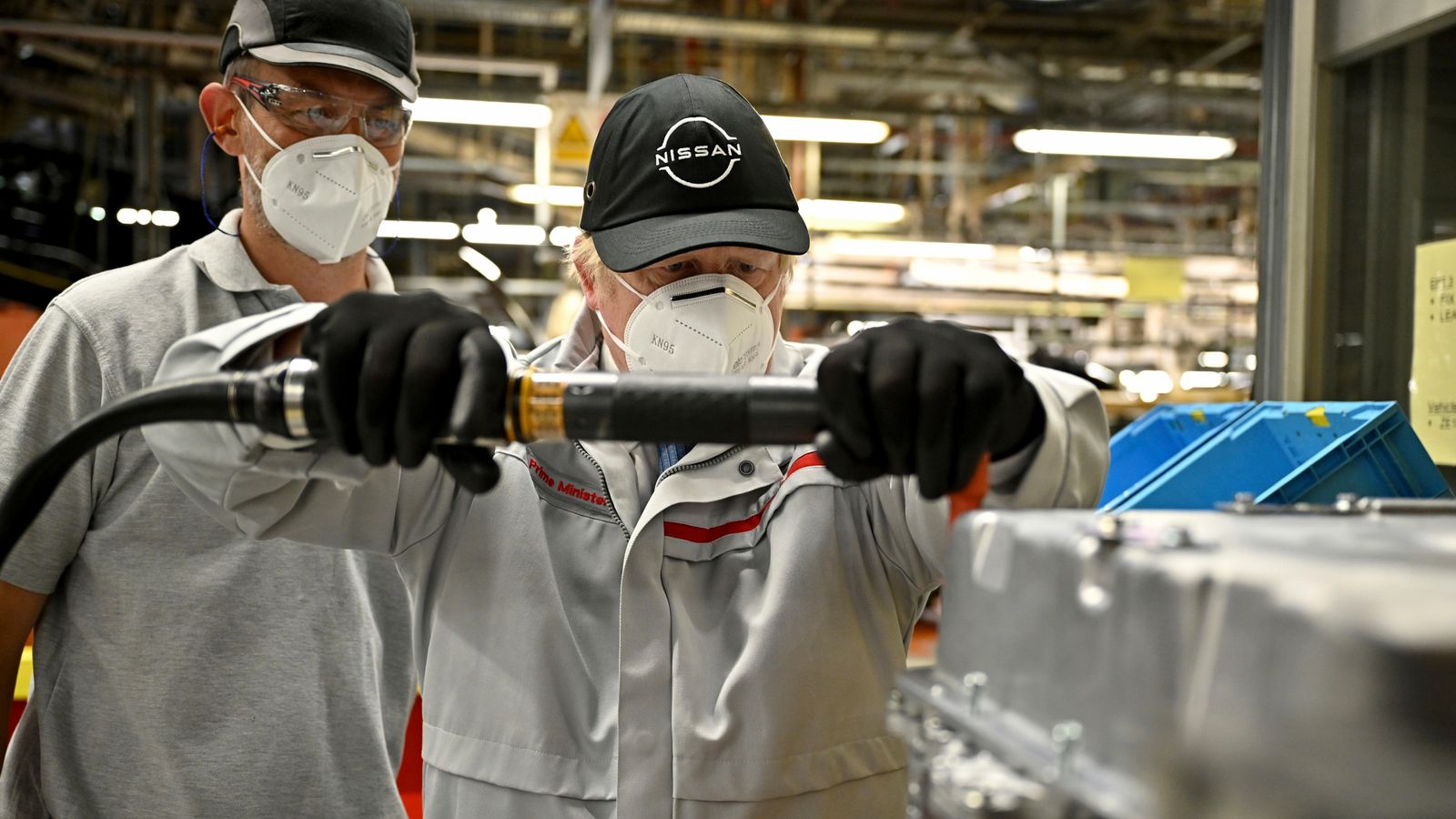The announcement of a battery “gigafactory” in Sunderland is a significant moment on the road to electrifying the UK car fleet, a journey that until now had barely left the kerb.
The new factory, built by Chinese manufacturer Envision, will be the largest of its kind in the UK with capacity to produce 9GWh of battery power a year, and space on the site to increase to 25GWh and eventually 35GWh.
Crucially it will have an immediate market for the 100,000 or so lithium-ion batteries it is sketched to produce each year.
They will go straight into new all-electric models rolling off the production line at Nissan‘s Sunderland car plant, the largest in the UK and among the most efficient in the world.
The new model, described only as an “all-electric crossover”, will join the battery-powered Leaf, as well as a hybrid version of the Qashqai and the Juke, all produced on Wearside.
It is unequivocally good news, and not just for the 6,000 or so staff already directly employed by Nissan who have the security of a new model future-proofed against the ban on new internal combustion engine vehicles from 2030.
A further 900 roles will come with the new model, as well as 750 jobs at the battery plant, which promises to be ground-breaking for more than the batteries it produces.
Built on the site of Sunderland’s International Advanced Manufacturing Park, it will be powered by a “microgrid” running on 100% sustainable energy. The city council is putting £80m towards the project, a commitment it hopes will attract other hi-tech investors to the region.
Central government is understood to have committed around £100m directly to Nissan and Envision.
At around 10% of the project costs, it is about the going rate for state sponsorship of major industrial investments, and allows Prime Minister Boris Johnson to claim his “green industrial revolution” is more than rhetoric.
The move is also quite a turnaround for Nissan. Until late last year, the company was still warning a no-deal Brexit could render the Sunderland plant untenable.
Today it says the UK’s departure from the EU gives it a competitive advantage, the volte-face – or should that be volt-face – a consequence of new “rules-of-origin” included in the Brexit deal.
By 2027, the majority of a vehicle’s value must derive from parts made in the UK or EU or it face tariffs on export.
In electric vehicles that means the battery, so by producing them in Sunderland, Nissan will ensure tariff-free access to European markets, as well as avoiding the financial and environmental costs of transporting batteries long distances.
The Sunderland commitment should be seen as part of a pan-European strategy for Nissan and its partner Renault, which unveiled an Envision gigafactory in France earlier this week.
The reason for the change of heart will matter less to Mr Johnson than the fact one of the country’s largest inward investors is pouring money into the UK six months after Brexit became a reality.
It was no surprise that the PM, previously known for his commitment to cycling, travelled to Sunderland for an announcement that ties together Brexit, the 2050 carbon net-zero target, and his “levelling-up” agenda, hitherto more slogan than substance.
Welcome though this investment is, 9GWh a year is not much more than a flicker compared to the battery production the UK will need keep pace with European competitors.
Industry body the Society of Motor Manufacturers and Traders said this week the UK should target 60GWh of battery production by 2030, and there are few signs that will be met.
By 2025, the UK is forecast to have 12GWh of production, less than a 10th of the 122GWh planned by Germany, and behind Poland, Hungary and Sweden.
By 2030, the gap with Europe will have widened, with the UK projecting 37GWh of capacity against an EU total of 640GWh.
There are plans for a second gigafactory in the North East, with BritishVolt hoping to begin production on the site of Blyth power station in Northumberland in 2023. In time they aim to make 300,000 batteries a year.
Consultation has also begun on a West Midlands Gigafactory at Coventry Airport.
Germany, by contrast, has nine battery plants in production or planning to support the transition of its famed automotive industry from gas guzzling to gigawatts.
Listen and subscribe to The Ian King Business Podcast here
The UK may get a second jolt of good news in the coming weeks with the government increasingly confident that Vauxhall owner Stellantis will commit to building an electric vehicle at its Ellesmere Port plant.
Business Secretary Kwasi Kwarteng has been in talks with the conglomerate for months trying to persuade them to commit to the UK, and a positive outcome is now expected.
Stellantis has been clear that the 2030 ICE ban means only electric makes sense at Ellesmere Port once the current petrol and diesel Astra model reaches the end of its life.
More than 1,000 jobs hang in the balance, as well perhaps as the UK’s chances of retaining its relevance in automotive production.
Alongside Nissan’s commitment, it could be the jump start Britain’s electric era requires.



